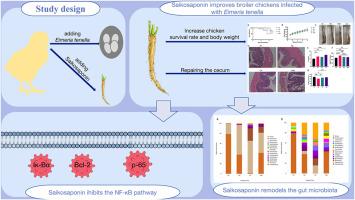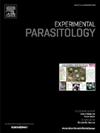Saikosaponin inhibits Eimeria tenella infection by modifying the NF-κB pathway and regulating cytokines and the intestinal microbial community
IF 1.6
4区 医学
Q3 PARASITOLOGY
引用次数: 0
Abstract
Eimeria tenella (E. tenella) is an intestinal parasite that not only endangers the health of broiler chickens but may also cause death in severe cases. However, the growing critical problem of drug resistance in E. tenella complicates therapy. Consequently, a more natural and safer technique for treating E. tenella is urgently warranted. Saikosaponin (SS) is a saponin component extracted from the traditional Chinese herb Chaihu that has been demonstrated to treat various diseases. However, little is known regarding the function of SS in E. tenella treatment. In the present investigation, SS lowered the weight loss rate and increased the survival rate of broiler chickens infected with E. tenella. SS inhibited the NF-κB pathway and regulated the gut microbiota structure to inhibit E. tenella-induced inflammatory damage in broiler chickens. In addition, 16S high-throughput sequencing results demonstrated that SS reconstructed the gut microbiota of E. tenella infected broilers, preserving gut microbial balance, increasing the production of total short-chain fatty acids (SCFAs), repairing intestinal villi and intestinal wall integrity, and decreasing inflammatory cell infiltration in the cecum. Overall, these findings show that SS could prevent E. tenella-induced inflammatory damage in broiler chickens by blocking the NF-κ B pathway and regulating the gut microbiota composition.

柴胡皂苷通过改变 NF-κB 通路、调节细胞因子和肠道微生物群落来抑制天牛埃默氏菌感染。
天牛埃默氏菌(E. tenella)是一种肠道寄生虫,不仅危害肉鸡的健康,严重时还可能导致死亡。然而,天牛埃默氏菌的抗药性问题日益严重,使治疗变得复杂。因此,迫切需要一种更天然、更安全的技术来治疗天牛肠虫。柴胡皂苷(SS)是从传统中草药柴胡中提取的一种皂苷成分,已被证明可治疗多种疾病。然而,人们对柴胡皂苷治疗天牛的功能知之甚少。在本研究中,SS 可降低感染天牛的肉鸡的体重损失率并提高存活率。SS 可抑制 NF-κB 通路并调节肠道微生物群结构,从而抑制天敌引起的肉鸡炎症损伤。此外,16S 高通量测序结果表明,SS 能重建感染了天牛嗜血杆菌的肉鸡的肠道微生物群,保持肠道微生物平衡,增加总短链脂肪酸(SCFAs)的产生,修复肠绒毛和肠壁的完整性,减少盲肠中炎症细胞的浸润。总之,这些研究结果表明,SS 可通过阻断 NF-κ B 通路和调节肠道微生物群的组成来预防天牛肠杆菌诱发的肉鸡炎症损伤。
本文章由计算机程序翻译,如有差异,请以英文原文为准。
求助全文
约1分钟内获得全文
求助全文
来源期刊

Experimental parasitology
医学-寄生虫学
CiteScore
3.10
自引率
4.80%
发文量
160
审稿时长
3 months
期刊介绍:
Experimental Parasitology emphasizes modern approaches to parasitology, including molecular biology and immunology. The journal features original research papers on the physiological, metabolic, immunologic, biochemical, nutritional, and chemotherapeutic aspects of parasites and host-parasite relationships.
 求助内容:
求助内容: 应助结果提醒方式:
应助结果提醒方式:


